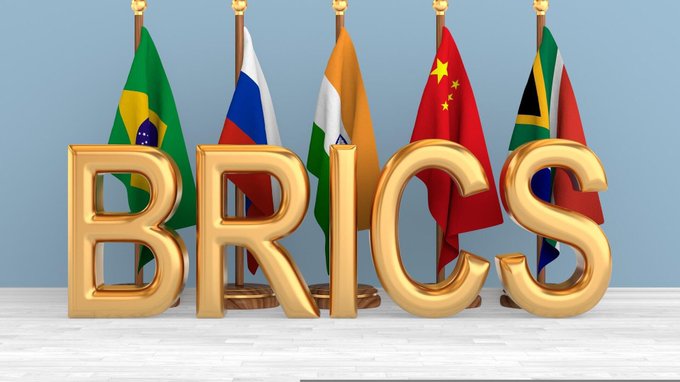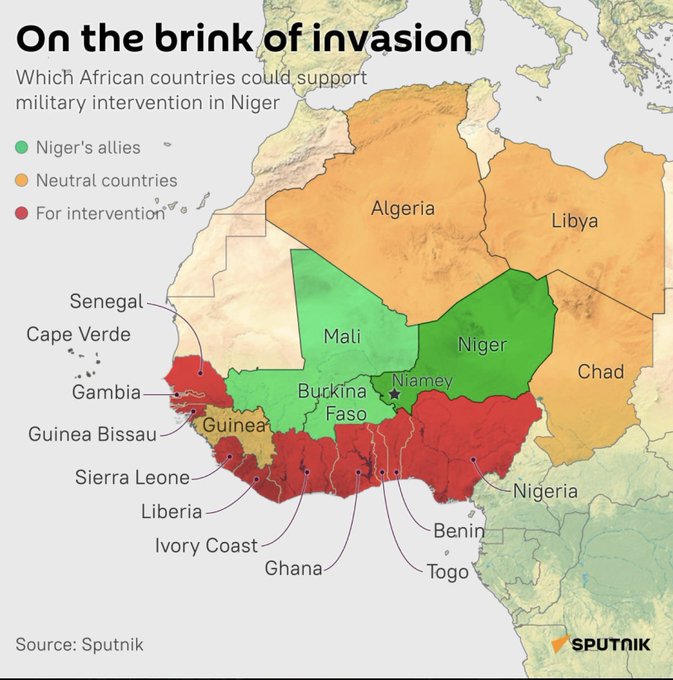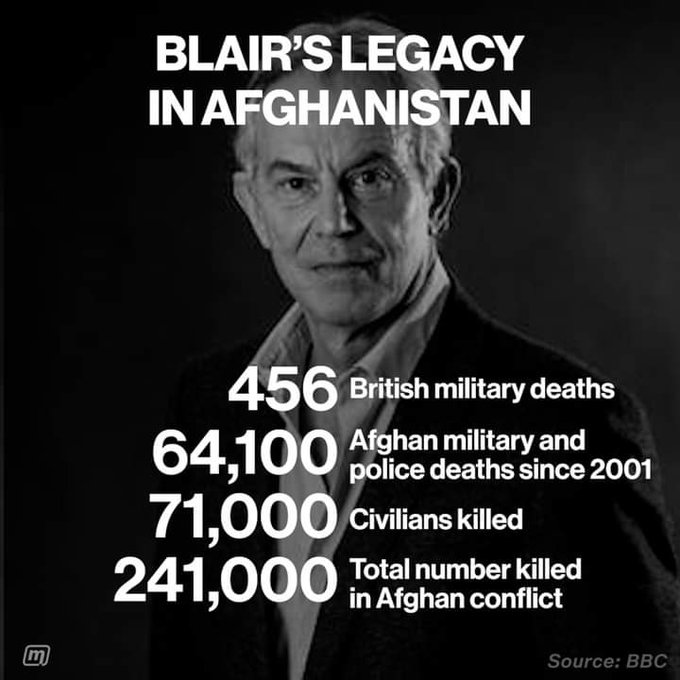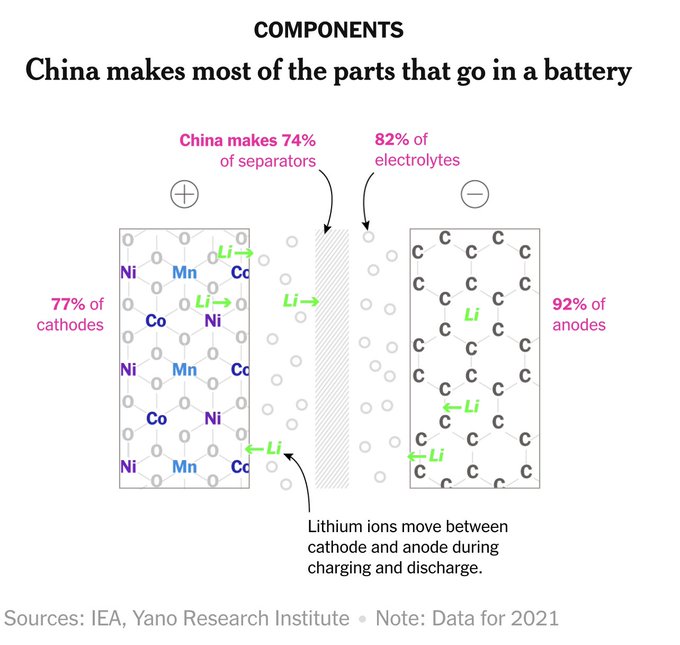Proxy war
Proxy war – a war instigated by a major power that does not itself participate
Ordezko gerlaz:
Oraingoa:
Errusia versus (Ukraina, AEB, EB, NATO)
Laster ikusiko duguna:
Txina versus (Taiwan, AEB, EB?, NATO)
Gerla horien atzean dagoena: sistema multipolarra versus sistema unipolarra
BRICS
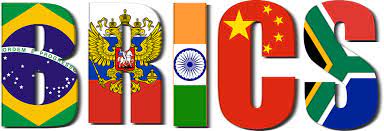
Learn #MMT
Warren Mosler
(http://www.collectedworksofwarrenmosler.com/)
Randall Wray
Randall Wray: Dirua hasiberrientzat
Randall Wray: dirua hasiberrientzat (elkarrizketa)
“Whaever is doable is financially affordable”, alegia, “Egingarria den edozer eskuragarria da
finantzen aldetik.”
Randall Wray: Egin al dezakegu diruak guretzat lan egin dezan?
Randall Wray: nola MTM-k mundua salba dezakeen (elkarrizketa)
“Whar matters is resoursez, not money”, alegia, “Axola duena baliabideak dira, ez dirua.”
Sarrera:
Excellent article by @jeremycorbyn which includes this powerful message by a survivor of the atomic bombs dropped on Japan: ‘Nuclear weapons are an absolute evil that cannot coexist with humans. There is no choice but to abolish them.’
Jeremy Corbyn: ‘Humanity Cannot Survive a Nuclear War’
On Hiroshima Day, Jeremy Corbyn argues that the world has never been closer to nuclear war – and that the only way to avoid catastrophe is to abolish nuclear weapons once and for all.

‘All I can do is pray – earnestly, relentlessly – for world peace.’ Fujio Torikoshi was eating breakfast with his mother when the atomic bomb was dropped on Hiroshima. Feeling a rumble underneath his feet, Fujio stepped outside into the front garden and saw a black dot in the sky. That’s when it burst outwards, filling the sky with blinding white light.
The last thing he remembers was being lifted off the ground by a hot gust of wind. More than two kilometres away from the hypocentre, Fujio woke up to a burning sensation on his face and arms, and to the sound of his mother crying out his name. Drifting in and out of consciousness as he was transported between hospitals, Fujio was told he wouldn’t live beyond 20. He is now in his nineties, still making his plea for a more peaceful world.
Testimonies from people like Fujio are often lost in the statistical horror of the bomb’s death toll which, together with the attack on Nagasaki, was more than 200,000 people. On Hiroshima Day, we remember every single person who was killed by an indefensible act of inhumanity. We also commemorate the hundreds of thousands of survivors – known as the hibakusha – who endured the horror of what was left behind: nuclear radiation, mass destruction and unimaginable grief.
‘We have reassured our will to save humanity from its crisis through the lessons learned from our experiences, while at the same time saving ourselves.’ This remains the mantra of Nihon Hidankyo, a group of elderly hibakusha – formed in 1965 – who have dedicated their lives to nuclear disarmament. ‘Nuclear weapons are an absolute evil that cannot coexist with humans,’ a survivor named Taniguchi Sumiteru said in 2010. ‘There is no choice but to abolish them.’
Some may be suspicious of a statement so pristine, naked and simple. But the truth so often is. Nuclear weapons have one purpose, and one purpose only: to cause death and destruction on a colossal scale. I will never understand the pride and excitement with which so many politicians proclaim they would be prepared to launch a nuclear attack. In what circumstances is it necessary to annihilate humanity? Do they know what a global nuclear war would actually look like?
Many of us may remember a pamphlet, published by Margaret Thatcher’s government in 1980, called Protect and Survive. Advising people what to do in the event of a nuclear attack, the 32-page handbook was roundly mocked for its rather optimistic attitude toward complete and utter annihilation. People were instructed to hide under a pile of their heaviest possessions, place dead bodies of relatives in another room or, if outside, lie flat in a ditch and ‘cover the exposed skin of the head and hands.’
But there is no survival kit for a global nuclear war. You might even find yourself wishing you were killed by the initial explosion when nuclear firestorms release sun-blocking soot and smoke into the sky, causing temperatures to plummet and oceans to freeze. If you survive the resultant mass crop failure and global famine, your celebration may be premature if the radioactive fallout has already penetrated your skin.
Many hide their entertainment of mass extinction behind the myth of nuclear deterrence. I could list several examples of when the threat of nuclear retaliation has failed to deter an invasion. Or posit various other factors to explain why nuclear weaponry is one of countless possible reasons when war is averted. Ultimately, though, why debate the failures of deterrence theory when the survivors of hibakusha have lived it?
At worst, nuclear deterrence theory encourages nations to strengthen their arsenal, putting the globe at even greater risk of total destruction. At best, we’re left with the following comfort: those with the power to destroy us all have not yet done so. ‘This is the closest the clock has ever stood to humanity’s darkest hour,’ UN Secretary-General António Guterres told the General Assembly earlier this year. He was referencing the infamous Doomsday clock, invented in 1947 to measure humanity’s proximity to self-destruction. Announcing that the clock had moved to 90 seconds to midnight, Guterres declared that humanity was perilously close to catastrophe.
It’s been eighteen months since Russia launched its invasion of Ukraine, and the threat of nuclear escalation continues to be downplayed by nation states across the globe. In February this year, Russia announced its plans to halt participation in New Start, the last remaining nuclear arms control treaty with the U.S. Indeed, the global stockpile of nuclear weapons is accelerating as international relations are deteriorating. After a period of gradual decline that followed the end of the cold war, the number of operational nuclear weapons has risen again; there are now said to be more than 12,500 warheads around the world. 90% are owned by Russia and the United States alone.
The world is gearing itself up for mutually assured destruction – and the UK is an active participant. In 2021, the UK government announced that it was increasing its nuclear stockpile by more than 40%. Last month, and at a time when every other department remains gravely underfunded, the UK government announced that the military budget would grow to £50 billion. When Defence Secretary, Ben Wallace, said that the UK would descend into war by the end of this decade, one would hope our media had the foresight to ask him some simple questions: what are you doing to prevent the descent into a protracted, all-out-war with Russia? What are you doing to bring about lasting peace?
As the threat of nuclear war looms large, I echo the calls made by the UN Secretary-General, Pope Francis, and global leaders such as President Lula: for de-escalation, diplomatic intervention and an end to this brutal war. The longer the fighting goes on, the more lives will be lost, the greater the destruction to our perilously fragile climate, and the greater risk of total annihilation for us all. Those who fuel the conflict must know that, in the event of a nuclear war, nobody wins.
If the UK government wanted to be a global leader, it would advance the cause for nuclear disarmament by signing the Treaty on the Prohibition of Nuclear Weapons, which bans the development, production, possession, use or threat of use of nuclear weapons. Instead, it cannot even honour the treaties it has already signed; our government claims it is still committed to the Treaty on the Non-Proliferation of Nuclear Weapons (signed by Harold Wilson in 1968), but its stockpiles speak louder than words.
Security is not the ability to threaten and destroy your neighbour. Security is getting on with your neighbour. It’s when our children can be confident of a habitable future. It’s when human beings are not displaced by poverty, destitution and war. And it’s when everybody has enough resources to live a happy and healthy life. The government spends £8,300 every minute on nuclear weapons – imagine if we spent that money on renewable energy, social housing, public healthcare, schools and lifting children out of poverty instead?
Some may say that war is a bad time to talk about nuclear disarmament. In reality, there is no better time to do so. Many of us grew up with the real and terrifying threat of nuclear destruction during the Cold War. I don’t want our children learning how to duck and cover in preparation for its return. Today, let’s listen to the hibakusha when they say: ‘humans must survive – in peace and prosperity.’ We will only honour their words – as well as the memory of those who perished on August 6th, 1945 – when we rid this planet of nuclear weapons once and for all.
About the Author
Jeremy Corbyn is the member of parliament for Islington North.
Segida:
We have mobilised against austerity before. We will do so again. My piece in the @IslingtonTrib
on why my constituents deserve an economic alternative worth voting for.
oooooo
David Roth-Lindberg@RothLindberg
Germany has abandoned freedom of speech and you get jailed if you speak the truth. Germany is now a fake democracy!
Txioa aipatu
Johnny miller@johnnyjmils
15 h
Great to hang out with my dear friend Alina Lipp in Donestk. She’s facing three years jail in Germany for her reporting in Donbass. Here’s why her story is important for the future of Europe. Germany has effectively criminalised even talking about peace.
oooooo
“Have you learnt nothing at all from your mistakes?” German MEP Sevim Dagdelen warns against a new intervention in Niger.
Bideoa, hemen: https://twitter.com/i/status/1688638818050555906
oooooo
“British-trained Ukrainian soldiers are ill-prepared and refuse to take an active part in the so-called counter-offensive” —Ukrainian soldier
Bideoa, hemen: https://twitter.com/i/status/1688615448210767872
oooooo
If ECOWAS has the right to intervene militarily in Niger because of the overthrow of its elected President, then why didn’t Russia have the right to intervene militarily in Ukraine after Ukrainian President Viktor Yanukovych was overthrown in 2014? #Niger
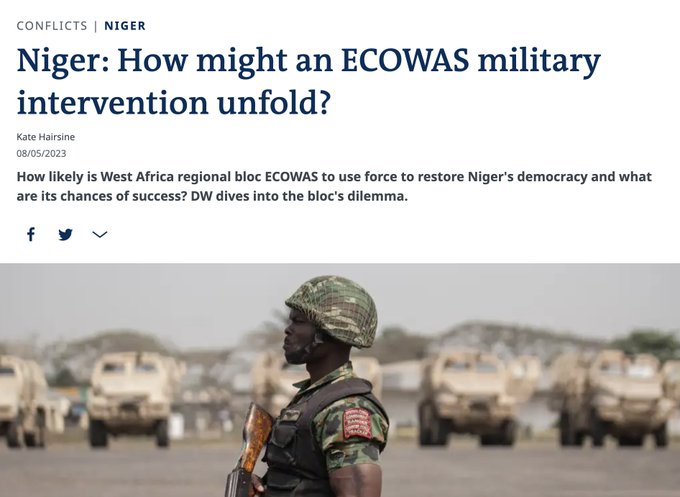
Angelo Giuliano / living in
@Angelo4justice3
Millions went into the streets to protest Macron in France
Millions went into the streets in Burkina Faso, Mali, Niger and finally overthrew their Western controlled puppet regimes.
Wonder who is the real dictator here. The real definition of democracy is > power to the people
What annoys the globalists is the fact that people are finally getting the power at the expense of the West and multinational corporations.
Mainstream media are having a hard time to cope
oooooo
Going Underground@GUnderground_TV
Jeffrey Sachs on Europe and the US telling African countries to just ‘govern properly’
Bideoa, hemen: https://twitter.com/i/status/1688846784955568128
oooooo
Figaro: French senators (94) sent an open letter to Macron in which they informed him and the public about the collapse of the French strategy in Africa.
oooooo
“We have been receiving French aid for 63 years, yet our country has not developed, so cutting it off from us now will not kill us, rather it will motivate us to work and rely on ourselves.” – President Ibrahim Traore of Burkina Faso
oooooo
Residents of Burkina Faso rally in support of Niger & Russia
Bideoa, hemen: https://twitter.com/i/status/1688904945334878208
oooooo
Jackson Hinkle @jacksonhinklle
“Victoria Nuland thought that with Niger you can do the same as with Ukraine: put couple of buns in a plastic bag and fool them? Such banana regimes, as in Kyiv, are no longer to be found.” – Maria Zakharova, Russian Foreign Ministry Spokeswoman
oooooo
Jackson Hinkle @jacksonhinklle
Burkina Faso has TERMINATED their Non-Double Taxation Treaty with France since 1967.
Au revoir!
oooooo
“The CIA assassinated your first popular leader Mr. Lumumba…”
American economist Jeffrey Sachs drops some truth about the Congo
Bideoa, hemen: https://twitter.com/i/status/1688947262725009411
oooooo
South Africa’s Foreign Minister has revealed the 23 countries that have formally submitted applications to join BRICS:
Algeria Argentina
Bangladesh
Bahrain
Belarus
Bolivia
Cuba
Egypt
Ethiopia
Honduras
Indonesia
Iran
Kazakhstan
Kuwait
Morocco
Nigeria
Palestine
Saudi Arabia
Senegal
Thailand
UAE
Venezuela
Vietnam
youtube.com
Ritter: Without Arms Control We Are All Dead
Scott Ritter warns that America’s stated, strategic plan is to destroy Russia will spell the end of life on t
Bideoa: https://youtu.be/Bw3r
oooooo
“Today Niger, yesterday Mali, CAR, Burkina Faso rejected France, French forces and French enterprises”
-> the Le Figaro newspaper quoted the letter about the collapse of France’s influence in Africa. It was written to Macron by 94 French senators.
They named Ivory Coast, Senegal, Algeria, Tunisia and Morocco among those that have become problematic for France.
After the failure of the French military intervention in 2014, the Wagner Group came to Africa. Specifically to those countries whose leaders unite the population against “the former colonial power,” the letter said.
“The French Africa of yesterday is being replaced by a military Russian Africa, an economic Chinese Africa, and a diplomatic American Africa.
Africa, a friendly continent, no longer understands France and is increasingly challenging its role and presence,” the French senators wrote.
Angelo Giuliano / living in
@Angelo4justice3
Africans used by their Western masters fighting Africans would be the most shameful action. Time for Africans to wake up, time to overthrow those wannabe “Zelensky” who just want more cash and properties on the French Riviera
A new memorial in southern Taiwan has been unveiled to remember the 1,000s of Taiwanese youths who volunteered to help the Japanese war effort during World War II.
Bideoa, hemen: https://twitter.com/i/status/1688897858391732225
oooooo
Wow. Just wow. That’s absolutely appalling. They’ve really decided to emulate Ukraine in just about every way, haven’t they? Even in their rehabilitation of WW2 collaborators.
Txioa aipatu
TaiwanPlus@taiwanplusnews
abu. 8
A new memorial in southern Taiwan has been unveiled to remember the 1,000s of Taiwanese youths who volunteered to help the Japanese war effort during World War II.
Bideoa, hemen: https://twitter.com/i/status/1688897858391732225
oooooo
Mali has become the first former French colony beyond North Africa to DROP French as its official language.
oooooo
Going Underground@GUnderground_TV
Putin: Who gave NATO the right to kill Gaddafi?
Bideoa, hemen: https://twitter.com/i/status/1689211475569602561
oooooo
CoolSocialistGrandad man of peace@cool_grandad
Then we have Tony Blair Afghanistan Iraq Yugoslavia now he is back in charge of the labour party. People still worrying about Jeremy Corbyn https://youtu.be/vjJyfMsDFjo if there was any justice he wouldn’t be walking about https://youtu.be/Z2WCC9pkZzE
George Galloway@georgegalloway
Niger is required to keep 50% of its foreign currency in a French bank. They have none of their own gold or uranium while their products have made France wealthy Follow
Bideoa, hemen: https://twitter.com/i/broadcasts/1lDxLnlOzEzGm
oooooo
George Galloway@georgegalloway
Coming up after the break …
will join me on The Midweek Mother of All Talkshows on #UkraineRussiaWar #MOATS LIVE
9pm BST LONDON
1pm PT | 4pm ET
#MOATS LIVE
oooooo
Since we’re talking about coups, here’s a list of coups perpetrated by the CIA in Latin America.
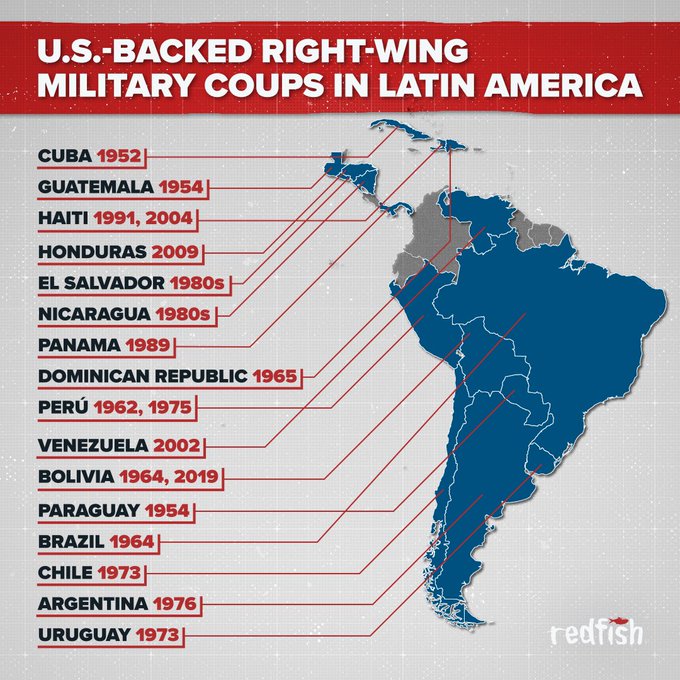
Bideoa: https://youtu.be/9zLDkSq0FxQ
oooooo
youtube.com
TG 1247: The Gaggle Talks To Scott Ritter
George Szamuely and Peter Lavelle sat down for another one of our regular conversations with inte
Bideoa: https://youtu.be/ULEjg6hMStU
oooooo
Seyed Mohammad Marandi@s_m_marandi
The EU is trying to starve Niger. What sort of evilness drives western regimes to keep doing this?
Txioa aipatu
DD Geopolitics@DD_Geopolitics
17 h
Sanctions against Niger are starting to work – EU Special Envoy Emanuela del Re.
“There is not enough medicine, food, electricity is missing – even more than before,” she noted.
The diplomat stressed that if the EU wants “the junta to weaken”, then the sanctions must be continued.
oooooo
erabiltzaileari erantzuten
China dominates entire battery supply chain. 92% of batteries in the world CANNOT be made without Chinese components! Some stats for China’s supremacy: Refining 67% of Lithium
Refining 63% of Nickel & 73% of cobalt
Refining 95% of Manganese
Manufacturing 77% of cathodes and 92% of anodes
Source: NY Times
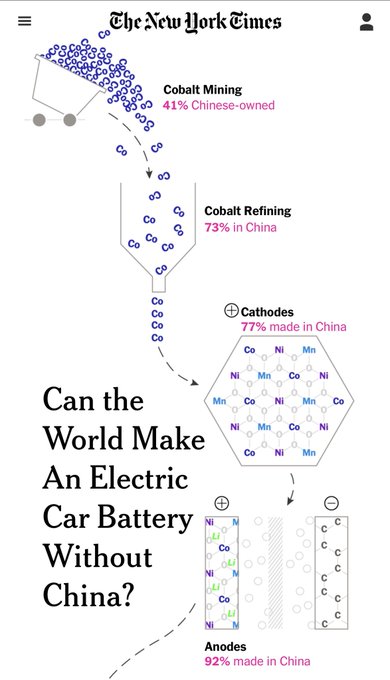
Zaharrak berri
El dret d’autodeterminació: deu preguntes per a aclarir una confusió interessada
-
El dret d’autodeterminació és reconegut pel dret internacional i cap norma estatal no el pot negar; però, malgrat això, les forces polítiques espanyoles i els mitjans intenten de crear confusió sobre què és i com s’aplica
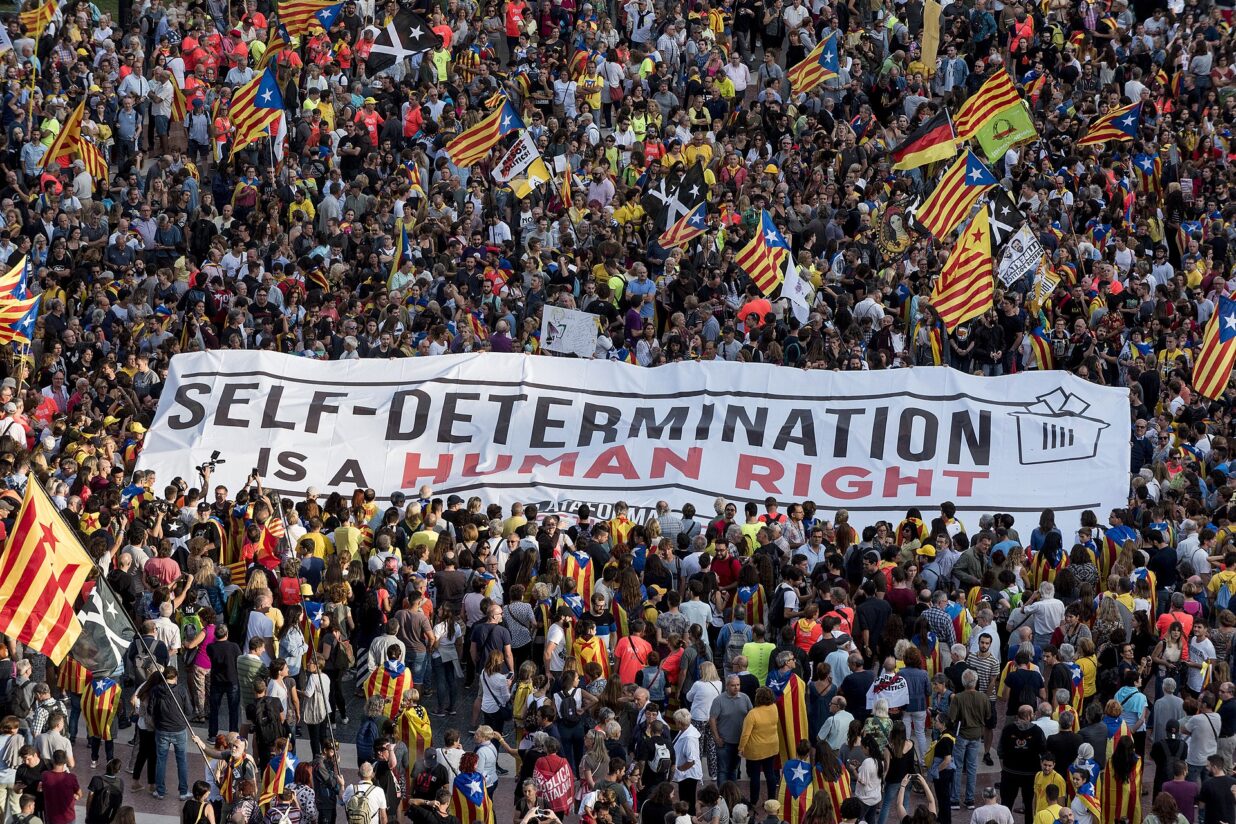
Manifestació a Barcelona els dies posteriors al Primer d’Octubre
05.08.2023
El debat sobre la investidura del pròxim president del govern espanyol ha tornat a posar damunt la taula el reconeixement del dret d’autodeterminació, objecte del referèndum del Primer d’Octubre, una de les condicions que posen els diputats independentistes catalans.
El dret d’autodeterminació és plenament reconegut pel dret internacional i cap norma estatal no el pot negar; però, malgrat això, les forces polítiques espanyoles i els mitjans intenten de crear confusió sobre què és i com s’aplica. En aquest article ho clarifiquem.
1. Existeix el dret d’autodeterminació dels pobles?
Sí. La llei internacional té allò que s’anomena ius cogens, és a dir, normes de dret imperatiu. Aquestes normes són part del dret internacional i cap estat no pot negar-les ni incomplir-les. La comunitat internacional considera que són per damunt de qualsevol legislació estatal, bé perquè la pràctica ho ha imposat així, bé perquè els tractats internacionals ho decreten així. Són normes imperatives, per exemple, la prohibició del genocidi, de la pirateria marítima, de l’esclavatge i de la tortura. El dret d’autodeterminació dels pobles es considera jurídicament una norma imperativa també, tal com ha estat remarcat en unes quantes sentències de la Cort Internacional de Justícia i tal com és reflectit a la carta de l’ONU.
2. En què consisteix el dret d’autodeterminació?
El dret d’autodeterminació és el dret que té un poble, una nació, de decidir si vol ser independent o no. El dret no pressuposa la voluntat d’independència ni obliga una nació a fer-se independent. Diu que té dret de decidir si vol ser independent o no. En termes jurídics el dret d’autodeterminació es coneix com el dret de qualsevol país de “triar la sobirania i l’estatus polític, sense compulsions externes ni interferències”.
3. Quina és la norma de l’ONU que reconeix el dret d’autodeterminació?
La Carta de l’ONU, que tots els estats que en formen part han d’acceptar, diu a l’apartat segon de l’article primer que la funció de l’organisme és de “desenvolupar entre les nacions unes relacions amistoses basades en el respecte al principi de la igualtat de drets dels pobles i del dret de la lliure determinació”.
Més tard, l’ONU va acordar el Pacte Internacional dels Drets Civils i Polítics que va reafirmar que “tots els pobles tenen dret a l’autodeterminació. En virtut d’aquest dret determinen lliurement l’estatus polític i procuren també pel desenvolupament econòmic, social i cultural”.
4. Els contraris a l’autodeterminació afirmen que cap estat no reconeix aquest dret. Com pot ser, doncs, una norma imperativa?
No és veritat que cap estat no reconegui aquest dret. Però fins i tot si fos així, no seria impediment per tal que la societat internacional el reconegués. A les constitucions estatals hi ha una contradicció flagrant respecte de la pràctica política dels estats: no es reconeix el dret d’autodeterminació dins el propi estat, però sí que es reconeix fora. Aquesta és una pràctica política habitual. El congrés espanyol, per exemple, el 2014 va reconèixer l’estat de Palestina. Reconeixia, per tant, de manera implícita, el dret d’autodeterminació alhora que el negava per als casos interns.
5. Però hi ha països que reconeguin l’autodeterminació a la constitució?
Sí. L’opinió segons la qual només ho fa Etiòpia és errònia. De manera indirecta el dret d’autodeterminació el reconeixen tots els estats que incorporen a la legislació el respecte de les normes del dret internacional –és a dir, la immensa majoria. De manera directa, reconèixer el dret d’autodeterminació a les minories internes d’un estat no és una pràctica habitual per raons òbvies, però molts estats, a l’hora d’explicar per què són independents, basen la seva existència en la invocació legal al dret d’autodeterminació mateix. En total, ara hi ha trenta-vuit estats que a la constitució vigent reconeixen l’existència del dret d’autodeterminació:
-Alemanya
-Angola
-el Bangladeix
-Bolívia (que explícitament l’atorga a les nacions índies del país)
-el Brasil
-Cap Verd (que s’obliga constitucionalment a donar suport als pobles que lluiten per l’autodeterminació)
-Catar
-Colòmbia
-Croàcia
-Cuba
-la República Dominicana
-l’Equador (que reconeix l’autodeterminació per als pobles indígenes)
-Eslovàquia
-Eslovènia
-Estònia (que reconeix les minories nacionals)
-Etiòpia (que reconeix el dret de secessió de les nacions que l’integren)
-França (que reconeix el dret d’autodeterminació als territoris d’ultramar)
-Guinea Bissau (que reconeix el dret d’autodeterminació de tots els pobles i s’obliga a donar-los suport)
-Hondures
-Hongria (que reconeix els drets de les minories)
-l’Iran
-Kossove
-Letònia
-Mèxic (que reconeix el dret d’autodeterminació de les minories)
-Montenegro
-Nicaragua (que reconeix el dret d’autodeterminació de les minories del país)
-el Paraguai
-les Filipines
-Portugal (que reconeix el dret d’independència de tots els pobles)
-Rússia (que reconeix l’autodeterminació de les nacions que en formen part)
-Sèrbia
-Sud-àfrica (que reconeix el dret d’autodeterminació de qualsevol comunitat que comparteixi una herència comuna cultural i lingüística, dins una entitat territorial)
-el Sudan (que reconeix encara el dret d’autodeterminació del Sudan del Sud)
-Surinam
-Timor Oriental
-Turcmènia
-Ucraïna
-Veneçuela
Hi ha més estats que reconeixen el dret d’autodeterminació de manera explícita a les lleis, encara que no ho facin a la constitució, com ara el Canadà (que reconeix el dret del Quebec), Dinamarca (que el reconeix per a les illes Fèroe i Grenlàndia), Itàlia (que reconeix a Àustria un paper de tutela respecte del Tirol del Sud), Finlàndia (que el reconeix per a les illes Aland), el Regne Unit (que reconeix el dret d’autodeterminació a molts dels territoris units per la corona), Suïssa (que reconeix el dret d’autodeterminació dels cantons) i els Estats Units (que ha reconegut en unes quantes sentències el dret de secessió).
6. Qui té dret d’autodeterminació?
Aquest és el punt més complicat de tots perquè ningú no ha definit de manera exacta què és un poble o una nació. El dret d’autodeterminació s’aplica com a regla indiscutible a qualsevol situació colonial –i, en particular, a la llista de colònies que defineix l’ONU. Aquest dret no el discuteix ningú. Quant a l’autodeterminació dels pobles no colonials, hi ha molta més discussió i no hi ha unanimitat.
7. Aleshores, es pot dir que si no ets colònia no tens dret d’autodeterminació?
No. Si ets una colònia, ningú no et discuteix el dret d’autodeterminació. Això val per a les colònies actualment reconegudes com a tals per l’ONU, entre les quals hi ha Gibraltar (que ha exercit el dret d’autodeterminació triant de quedar-se dins el Regne Unit), Nova Caledònia (que ha fet uns quants referèndums d’independència) i el Sàhara Occidental (que als efectes de l’ONU continua essent una colònia d’Espanya).
Si no formen part d’aquesta llista, el dret d’autodeterminació es reconeix d’acord amb la voluntat política dels estats. Encara que el sistema de l’ONU hagi deixat clar, sobretot amb les sentències de la Cort Internacional de Justícia, que aquest dret no és únicament per a les colònies, sinó per a qualsevol territori de qualsevol estat.
8. Quin pot ser un exemple de territori no colonial a qui li han reconegut el dret d’autodeterminació?
Tots els estats nous, en el moment que són reconeguts, ho són en virtut del dret d’autodeterminació i durant el segle XXI han aparegut més estats nous a Europa que als altres continents. Però un cas exemplar és el de Kossove. El dret d’autodeterminació de Kossove en aquest moment és reconegut plenament per cent onze estats membres de l’ONU, que ja hi mantenen relacions diplomàtiques, dels cent noranta-tres que en formen part. Hi ha uns quants estats, com ara l’estat espanyol, que reconeixen el dret del poble kossovès a l’autodeterminació, però no reconeixen l’estat resultant perquè no estan d’acord amb la manera com ha estat creat i n’hi ha uns pocs, particularment Sèrbia, que senzillament no li reconeixen el dret d’autodeterminació.
El dret d’autodeterminació va generalment vinculat al reconeixement d’un fet polític. Quan un poble, en sigui quina sigui la definició, proposa a la societat internacional un procés d’independència, aquells qui el reconeixen es basen en el dret d’autodeterminació, mentre que aquest dret és negat per una part dels que no el reconeixen.
9. Però aleshores, tot depèn de l’arbitrarietat política de cada estat?
No. El dret d’autodeterminació és reconegut internacionalment. És precisament el cas de Kossove, que va aconseguir una sentència històrica de la Cort Internacional de Justícia. Va reconèixer que la seva independència era vàlida a partir del principi d’autodeterminació proclamat a la Carta de l’ONU. Tanmateix, això no vol pas dir que les conseqüències de l’exercici del dret d’autodeterminació siguin automàtiques.
10. I, finalment, un estat pot invocar les lleis o la constitució per negar l’autodeterminació?
Ho pot fer a efectes polítics interns, però això no val a efectes internacionals, ni té cap valor legal. La sentència sobre Kossove de la Cort Internacional de Justícia és contundent quan afirma que cap llei domèstica ni internacional no pot ser emprada per a impedir la independència. La sentència també esclareix que la declaració unilateral d’independència no viola cap norma jurídica internacional. I afirma també que qualsevol referència a la unitat nacional o a la inviolabilitat de les fronteres inscrita en la constitució s’ha d’interpretar contra un altre estat ja constituït i prou, però en cap cas contra l’aspiració d’autogovern.
Gehigarriak:
Bien bitartean, mandanga Euskal Herri osoan:
Baina afera argi egon da hasiera hasieratik, Alfred de Zayas lekuko:
oooooo



